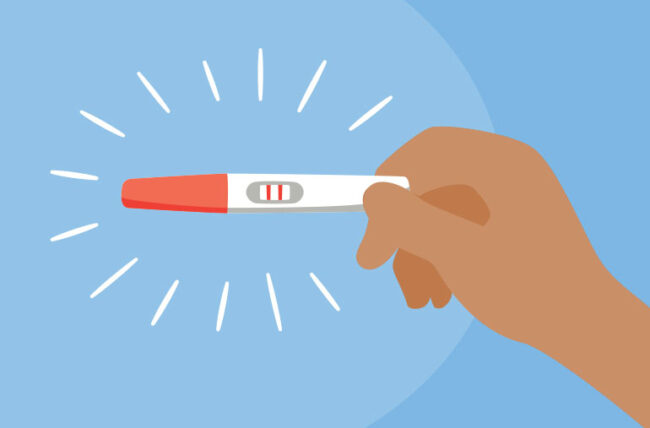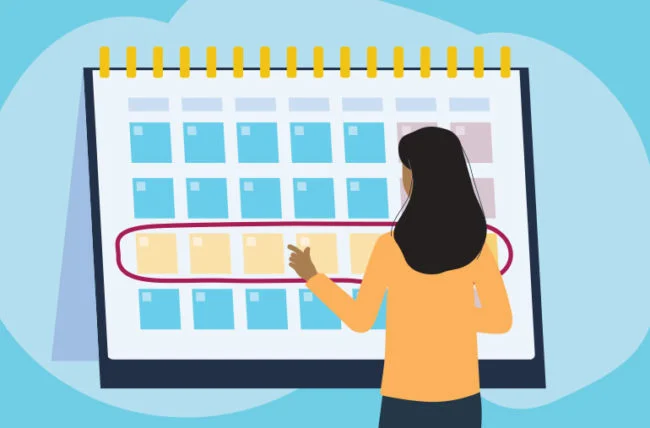The anticipation of trying to become pregnant is intense. The days on the calendar take on a new meaning when you are trying to get pregnant or thinking about quitting birth control. Is today an ovulation date? Is my period due? When should I consult a fertility specialist about my situation?
How long does it take to become pregnant?
Answer isn’t as simple as it seems. There are many factors to consider when determining how long it takes to conceive. The timeline is different for everyone.
As Ob/Gyn Chris Cantwell MD notes, “People have written entire textbooks about this stuff.”
We spoke with Dr. Cantwell about it to de-clutter it (but leave textbooks for the medical students).
How long does it take to become pregnant?
For starters, let’s review the “birds & bees”. You need vaginal sex, also known as penis-vaginal sex, to get pregnant naturally. This is the only type of sexual activity that will allow semen (sperm), to reach an egg, and fertilize it.
Semen must be placed in your vagina. It will then travel up your cervix, and towards your fallopian tubes, looking for an egg to fertilise. The developing embryo will then travel to the uterus once fertilized. Your body will soon start releasing Human Chorionic Gonadotropin also known as the pregnancy hormone. You’ll see a home pregnancy test around that time.
From unprotected sexual activity to a positive test, the timeline is roughly:
- 24 hours after sex, sperm fertilizes a egg.
- Six days after sexual activity, the fertilized egg implants itself in your uterus.
- After 11 days, pregnancy hormones are released.
Dr. Cantwell states that it is a widely accepted fact amongst pregnancy healthcare providers, that 80% people who have regular vaginal contact and don’t use birth control get pregnant successfully within six months. In 12 months, 5% more women will be pregnant.
Age is important
You will naturally lose fertility as you age. The American College of Obstetrics and Gynecology states that your chances of getting pregnant in any menstrual period are:
- People in their 20s or 30s can save 25%
- At age 40, 10% of the population will be able to vote.
These figures are based upon the age of people and women assigned to female at birth.
“We use 35 as a dividing point,” says Dr. Cantwell. We know that you are more likely to experience difficulty conceiving after 35. Also, complications are more common during pregnancy. It’s possible to have a healthy pregnancy and get pregnant after 35. However, research has shown that it can be more difficult.
Ovulation
It is personal how often someone has sex. To be honest, it’s probably one of the most private matters.
It’s not necessary to have sex every time you want to get pregnant. Dr. Cantwell says that the timing of sex is more important than its intensity (which might sound less than sexy).
He continues, “Ovulation occurs at the midpoint of the menstrual cycle and is when you are most fertile.” When the egg is released, sperm will fertilize it to develop into a baby.
It’s less important to have sex on the day of ovulation than it is to roll around in the hay.
You can calculate that you will ovulate 14 days after your last period if you have a period at least once every 28-35 days. You can increase your chances by having vaginal contact before or during ovulation.
Dr. Cantwell says that sperm can survive in the vaginal cavity for up to five days. If you have sex before or during ovulation, sperm will be in a position to reach the egg. The more sperm you have during the ovulation period, the higher the chance of fertilization.
Your ovulation schedule might look different. That’s OK. You might want to try an ovulation kit. You can use ovulation kits at home. These little sticks are similar to home-pregnancy tests. You pee on them. Instead of determining whether you are pregnant, these sticks will tell you if your ovulation is about to occur in the next few days.
Dr. Cantwell says that ovulation strips are designed to detect the luteinizing hormonal. “Ovulation can be triggered by an abrupt spike in LH. If you have a positive ovulation result, you’re likely to ovulate within the next 24 to 48 hours. We recommend that you start having sexual relations at that time.
Stopping birth control
You’ll need to stop using birth-control in order to become pregnant. This includes condoms and pills.
Dr. Cantwell explains that doctors may prescribe birth-control pills to treat irregular periods, acne, or other conditions. They’re still pills that prevent pregnancy. They will prevent you from becoming pregnant, even if you are taking them for some other reason. If you plan to get pregnant, you should understand your medication and how it affects your fertility.
In the same way, IUDs and implants for birth control can also prevent pregnancy. These are methods that you can set and forget. They’re meant to be something that you don’t need to worry about. If you want to become pregnant, it’s important to remember to have your birth control implants removed by a medical professional.
Some people are concerned that even after stopping birth control, their previous use could affect their future fertility. Dr. Cantwell believes that in most cases your reproductive ability will quickly return after you have stopped taking birth control.
He adds, “You can become pregnant the day after an IUD is removed.” After stopping birth control pills your hormones cycle naturally again in a few short weeks, and your ovulation returns to normal.
DepoProvera(r), a birth control shot, is an exception. After stopping the shot, it can take up to a full year before your fertility returns. If you’ve been trying to get pregnant for about six months and haven’t succeeded, your healthcare provider might be able recommend strategies that will increase your chances.
Preconception visits are worth considering
Dr. Cantwell suggests that you should talk to your healthcare provider about getting pregnant. Preconception counseling is highly recommended by ACOG to anyone considering pregnancy. Your provider may:
- You will be advised on how to improve your chances of becoming pregnant.
- Check for genetic disorders by screening and testing.
- You will be given advice on how to prepare for pregnancy, including the selection of a prenatal supplement.
- Make sure that you are up to date on your gynecological tests, such as Pap tests.
- Order all recommended vaccinations.
- Ask any questions about conception and pregnancy.
Advice on how to get pregnant quicker
Dr. Cantwell offers some tips to increase your chances of becoming pregnant.
- Keep track of your ovulation cycle and adjust the timing for sex.
- Maintain a level of stress that is manageable.
- Exercise regularly.
- Adopt a diet that is healthy.
- Maintain a healthy weight.
- Stop smoking.
- Limit your daily caffeine consumption to less than 200 mg.
He says that if you partner “saves” his sperm, it will help when your ovulating.
If they ejaculate frequently, the sperm count may be lower when you are having sex at your ovulation. This is not always necessary but could ensure that there is enough sperm when you are most fertile.
When to consult a fertility specialist
A visit to your doctor may be necessary if you have been trying and not seeing any results. You can ask them if it’s the right time to get additional fertility support.
Dr. Cantwell recommends that if you are over 35 and have not gotten pregnant after six months, you speak with your doctor about seeing a fertility specialist. People under 35 are advised to wait a year before consulting a fertility specialist.
He says that because fertility drops off faster in people over 30, he doesn’t think it is necessary to wait a year before looking into possible medical causes and treatment options.
If you think that you need help or have any risk factors for infertility, then your provider will be happy to meet with you and discuss your situation.






















